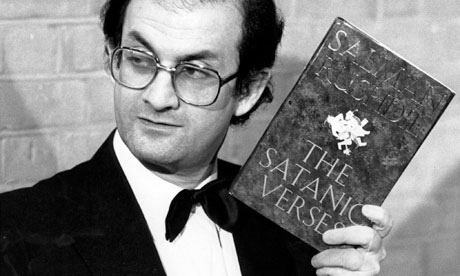Joseph Anton – the pseudonym adopted by the novelist while in hiding from death threats over The Satanic Verses – will be published in September

Salman Rushdie holding a copy of The Satanic Verses soon after its publication. Photograph: Graham Turner for the Guardian
Salman Rushdie is drawing the title of his new memoir from the alias he was forced to adopt during the decade he spent in hiding, Joseph Anton.
After the Iranian leader Ayatollah Khomeini issued a fatwa against Rushdie on 14 February 1989, sentencing him to death because his novel The Satanic Verses was accused of being "against Islam, the Prophet and the Qu'ran", the author went underground, living under police protection for almost 10 years. Asked to choose an alias for police to call him by, Rushdie plucked a name from the combination of the first names of two writers he loved: Joseph Conrad and Anton Chekhov.
"I made it the title of the book because it always felt very strange to be asked to give up my name, I was always uncomfortable about it, and I thought it might help dramatise, for the reader, the deep strangeness and discomfort of those years," said Rushdie.
Joseph Anton, out on 18 September, will tell of the years the author spent in hiding. "He talks about the sometimes grim, sometimes comic realities of living with armed policemen, and of the close bonds he formed with his protectors; of his struggle for support and understanding from governments, intelligence chiefs, publishers, journalists, and fellow writers; and of how he regained his freedom," said his publisher Random House. "How do a writer and his family live with the threat of murder for over nine years? How does he go on working? How does he fall in and out of love? How does despair shape his thoughts and actions, how and why does he stumble, how does he learn to fight back?"
Four years ago Rushdie received an apology in the high court from the author and publisher of a book about the time he spent under police protection, for false claims including that the author was locked in a room by his protection officers, with whom his relationship was claimed to be unfriendly. He has since been working with archivists at Emory University in Atlanta, where a collection of his papers is housed, to tell the story himself.
His publisher called Joseph Anton a book of "exceptional frankness and honesty, compelling, provocative, moving, and of vital importance. Because what happened to Salman Rushdie was the first act of a drama that is still unfolding somewhere in the world every day."
Story, and many interesting comments at The Guardian.
After the Iranian leader Ayatollah Khomeini issued a fatwa against Rushdie on 14 February 1989, sentencing him to death because his novel The Satanic Verses was accused of being "against Islam, the Prophet and the Qu'ran", the author went underground, living under police protection for almost 10 years. Asked to choose an alias for police to call him by, Rushdie plucked a name from the combination of the first names of two writers he loved: Joseph Conrad and Anton Chekhov.
"I made it the title of the book because it always felt very strange to be asked to give up my name, I was always uncomfortable about it, and I thought it might help dramatise, for the reader, the deep strangeness and discomfort of those years," said Rushdie.
Joseph Anton, out on 18 September, will tell of the years the author spent in hiding. "He talks about the sometimes grim, sometimes comic realities of living with armed policemen, and of the close bonds he formed with his protectors; of his struggle for support and understanding from governments, intelligence chiefs, publishers, journalists, and fellow writers; and of how he regained his freedom," said his publisher Random House. "How do a writer and his family live with the threat of murder for over nine years? How does he go on working? How does he fall in and out of love? How does despair shape his thoughts and actions, how and why does he stumble, how does he learn to fight back?"
Four years ago Rushdie received an apology in the high court from the author and publisher of a book about the time he spent under police protection, for false claims including that the author was locked in a room by his protection officers, with whom his relationship was claimed to be unfriendly. He has since been working with archivists at Emory University in Atlanta, where a collection of his papers is housed, to tell the story himself.
His publisher called Joseph Anton a book of "exceptional frankness and honesty, compelling, provocative, moving, and of vital importance. Because what happened to Salman Rushdie was the first act of a drama that is still unfolding somewhere in the world every day."
Story, and many interesting comments at The Guardian.
No comments:
Post a Comment